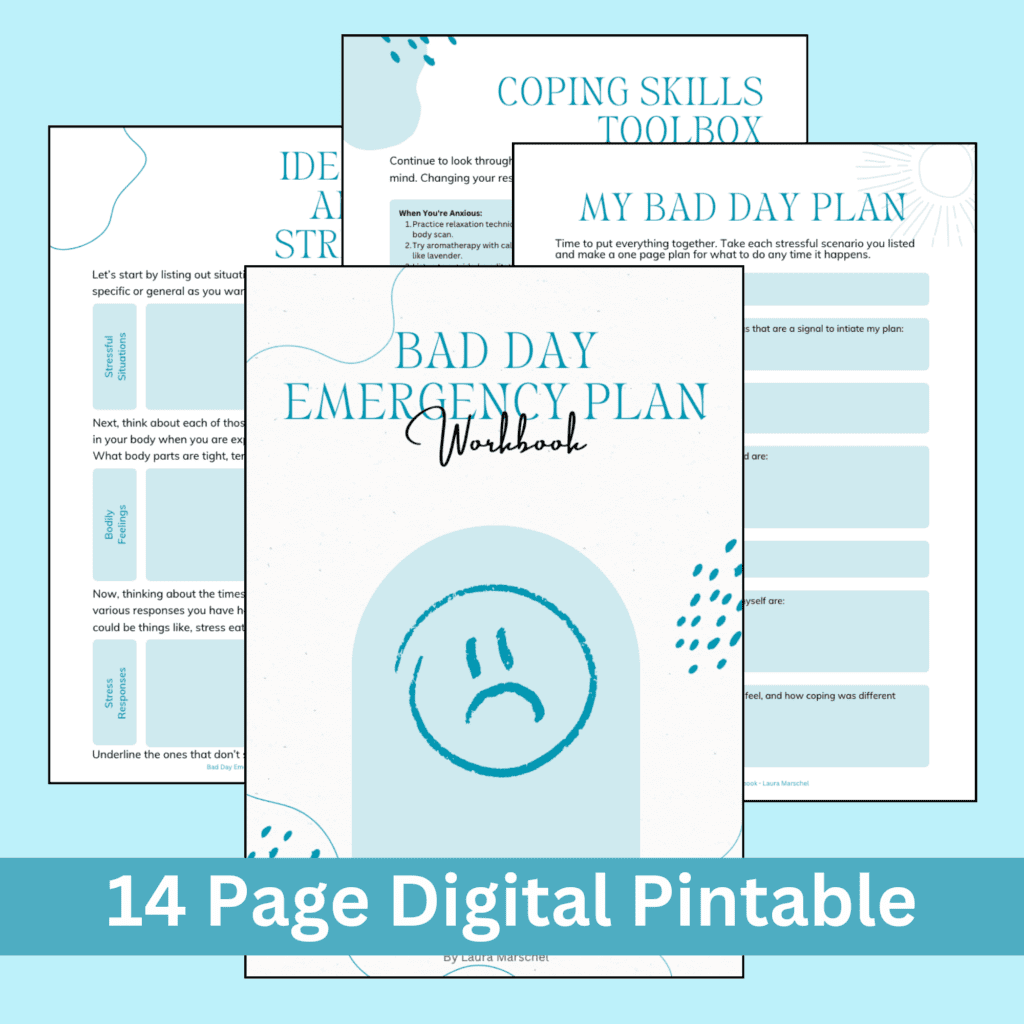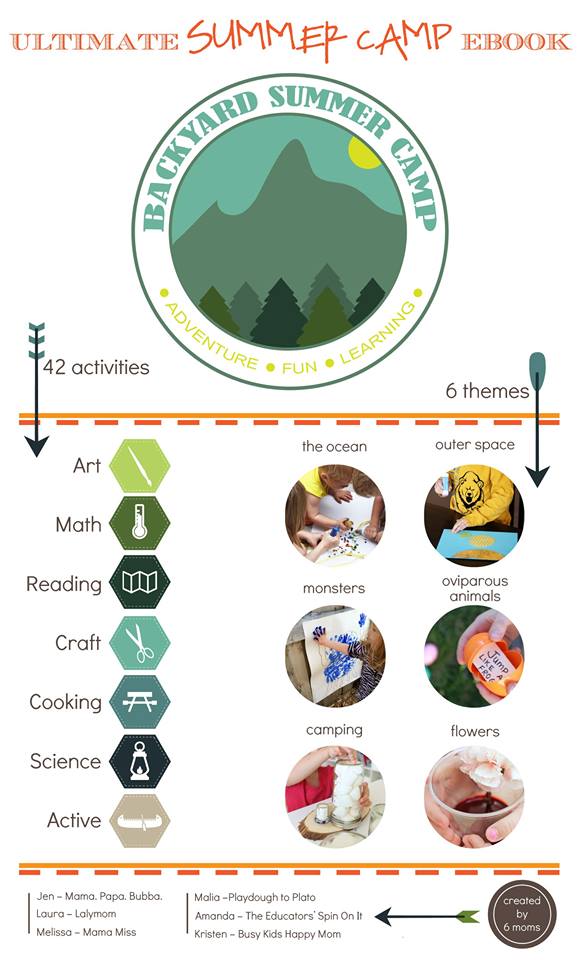100 Coping Skills & Bad Day Emergency Plan [Printable]
Today we are talking all about Coping Skills and how everyone should have a Bad Day Emergency Plan. Whether you have one bad day or many, it is important to have a plan that allows for all your emotions, but also helps you process them in healthy ways. This article shares ideas for all sorts of bad days.
I first came upon coping skills because I was struggling myself. I had tried many coping skills over the years, from stress eating, to nail biting, to mindlessly scrolling my phone and even some days, not getting out of bed.
A bad day, week, month or even year can really weigh on you. And who can blame you for finding ways to comfort yourself in the face of life's ups and downs?
But if you find yourself practicing habits that don't support you in a healthy way, those bad days add up to some pretty unwanted consequences. It could turn into health problems, missed work, strained relationships.
So taking the time to plan for a bad day when you aren't having one is crucial to giving your self good loving care. Just like any of your loved ones would deserve, you also deserve that care and attention.
To use this big list of coping skills ideas, think through the scenarios that lead you to engage in unhealthy coping habits, and find new ones below to replace the old ones.
You can also work through my Bad Day Emergency Plan Workbook if you want to go step by step:
100 Coping Skills and Ideas for Any Mood
When You're Sad:
1. Watch a heartwarming movie or TV show.
2. Listen to uplifting music or your favorite playlist.
3. Journal your thoughts and feelings.
4. Practice deep breathing exercises.
5. Cuddle with a pet.
6. Reach out to a friend or family member for support.
7. Take a leisurely walk in nature.
8. Read an inspirational book.
9. Engage in a creative hobby like painting or crafting.
10. Attend a yoga or meditation class.
When You're Angry:
11. Practice mindfulness meditation.
12. Punch a pillow or use a stress ball.
13. Write a letter (but don't send it) to express your anger.
14. Go for a run or engage in vigorous exercise.
15. Play an intense video game to release frustration.
16. Try progressive muscle relaxation.
17. Count to 10 before reacting.
18. Take a timeout to cool off.
19. Use positive affirmations to shift your mindset.
20. Seek professional counseling if anger is a recurring issue.
When You're Bored:
21. Pick up a new hobby or skill.
22. Organize a cluttered space.
23. Explore a new book genre.
24. Create a vision board for your goals.
25. Volunteer for a local charity or cause.
26. Learn a new language.
27. Take an online course.
28. Start a DIY project.
29. Visit a museum or art gallery.
30. Plan a weekend getaway or day trip.
When You're Triggered or Activated:
31. Practice grounding techniques (e.g., 5-4-3-2-1).
32. Call a trusted friend for support.
33. Use positive self-talk and affirmations.
34. Engage in mindfulness exercises.
35. Write in a “trigger journal” to process emotions.
36. Remove yourself from the triggering situation if possible.
37. Try EFT (Emotional Freedom Techniques) tapping.
38. Seek professional therapy or counseling.
39. Create a safe space or “calm corner” at home.
40. Explore trauma-informed yoga or therapy.
When You're Anxious:
41. Practice relaxation techniques like the body scan.
42. Try aromatherapy with calming scents like lavender.
43. Listen to a guided meditation for anxiety.
44. Write down your worries and create an action plan.
45. Focus on your breath and practice diaphragmatic breathing.
46. Use stress-relief apps or online resources.
47. Create a calming bedtime routine.
48. Challenge negative thoughts with cognitive-behavioral techniques.
49. Progressive muscle relaxation.
50. Practice self-compassion and self-care.
When You're Overwhelmed:
51. Prioritize tasks and create a to-do list.
52. Take short breaks throughout the day.
53. Practice the “Pomodoro Technique” for focused work.
54. Delegate tasks when possible.
55. Talk to a supervisor or manager about workload.
56. Use time management apps or tools.
57. Say no to additional commitments.
58. Seek support from colleagues or a mentor.
59. Break tasks into smaller, manageable steps.
60. Practice self-compassion and avoid perfectionism.
When You're Stressed:
61. Create a relaxation ritual (e.g., hot bath, tea, and soft music).
62. Practice mindfulness-based stress reduction.
63. Take a nature walk or hike.
64. Engage in progressive muscle relaxation.
65. Try stress-relief exercises like Tai Chi or Qigong.
66. Journal your stressors and brainstorm solutions.
67. Practice positive visualization.
68. Use stress-relief coloring books.
69. Delegate tasks and ask for help.
70. Set realistic goals and priorities.
When You're Lonely:
71. Join social clubs or meetup groups.
72. Reach out to old friends for a catch-up.
73. Attend social events or gatherings.
74. Volunteer to connect with others.
75. Join online forums or support communities.
76. Attend local classes or workshops.
77. Consider adopting a pet.
78. Host a game night or potluck with friends.
79. Try virtual hangouts or video calls.
80. Seek professional counseling for loneliness.
When You Need a Confidence Boost:
81. Reflect on past accomplishments.
82. Write a list of your strengths and qualities.
83. Dress in clothes that make you feel confident.
84. Set achievable goals and celebrate small wins.
85. Practice positive self-affirmations.
86. Surround yourself with supportive people.
87. Challenge self-doubt with evidence-based thinking.
88. Visualize success in a challenging situation.
89. Take on a new challenge or project.
90. Seek feedback and constructive criticism.
When You Need Relaxation or Self-Care:
91. Take a bubble bath with soothing music.
92. Practice progressive muscle relaxation.
93. Enjoy a spa day at home with facials and massages.
94. Get a massage from a professional therapist.
95. Treat yourself to a favorite dessert or treat in moderation.
96. Read a book in a cozy nook.
97. Spend time in a hammock or by the beach.
98. Practice restorative yoga or deep stretching.
99. Create a calming bedtime routine.
100. Listen to a guided relaxation or sleep meditation.
Grab a free printable copy of this coping skills list:
100 Healthy Coping Skills from Laura Marschel
I encourage you to explore these coping activities and discover which ones work best for you in different emotional situations. It's important to emphasize that we are all unique, and what works for one person may not work for another. So, experimenting and finding personalized coping strategies is key.







